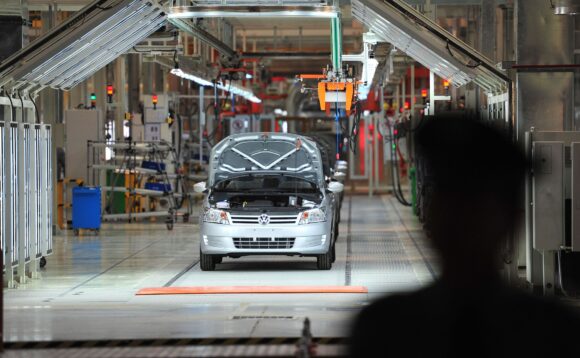Volkswagen AG faces mounting pressure to address allegations of human rights violations in the Chinese province of Xinjiang, where the German carmaker operates a car factory.
While there’s no evidence that anyone has been mistreated at the VW plant, the company should carefully examine the accusations, said supervisory board members Joerg Hofmann, a labor leader, and Stephan Weil, who represents VW’s anchor shareholder Lower Saxony.
“We have to concretely weigh the facts and on this basis answer the question if a termination of the activity there would be the right thing,” Hofmann told the Braunschweiger Zeitung in an interview, citing potential damage to VW’s reputation.
Volkswagen has fielded uncomfortable questions about its suppliers and operations in Xinjiang, where human rights groups and a panel of United Nations experts have raised concerns about coercive labor practices. China has repeatedly rejected criticisms of the work programs, calling allegations of forced labor lies and defending its policies as an effort to reduce poverty and unemployment.
Chief Executive Officer Herbert Diess has defended the company’s presence in the region, telling CBS’s 60 Minutes in April he’s “absolutely sure” there’s no forced labor at VW’s plant, and that locals “are much better off” if the company stays put. China is Volkswagen’s biggest market, accounting for roughly 40% of sales.
Volkswagen is “firmly opposed to forced labor,” Nicolai Laude, a company spokesman, said Friday. “In our worldwide business activities, we ensure that our values are lived and our standards are upheld. We expect the same from our local business partners.”
The automaker is also facing pushback from the German government. Berlin recently declined a Volkswagen request to renew risk insurance for the company’s Chinese operations over the human rights concerns, according to a person familiar with the matter. It’s the first time Berlin has rejected such a bid and shows a shift in tone on China, which became Germany’s biggest non-EU trading partner over the past two decades.
German Chancellor Olaf Scholz last month called out alleged abuse at detention for ethnic Uyghurs in Xinjiang and called on companies to do more to diversify their supply chains and export markets.
Photograph: A Volkswagen production facility in Urumqi, Xinjiang,, China. Photo credit: Getty Images/Visual China Group.
Topics China
Was this article valuable?
Here are more articles you may enjoy.



 Fingerprints, Background Checks for Florida Insurance Execs, Directors, Stockholders?
Fingerprints, Background Checks for Florida Insurance Execs, Directors, Stockholders?  What Analysts Are Saying About the 2026 P/C Insurance Market
What Analysts Are Saying About the 2026 P/C Insurance Market  Portugal Deadly Floods Force Evacuations, Collapse Main Highway
Portugal Deadly Floods Force Evacuations, Collapse Main Highway  AIG Underwriting Income Up 48% in Q4 on North America Commercial
AIG Underwriting Income Up 48% in Q4 on North America Commercial 

